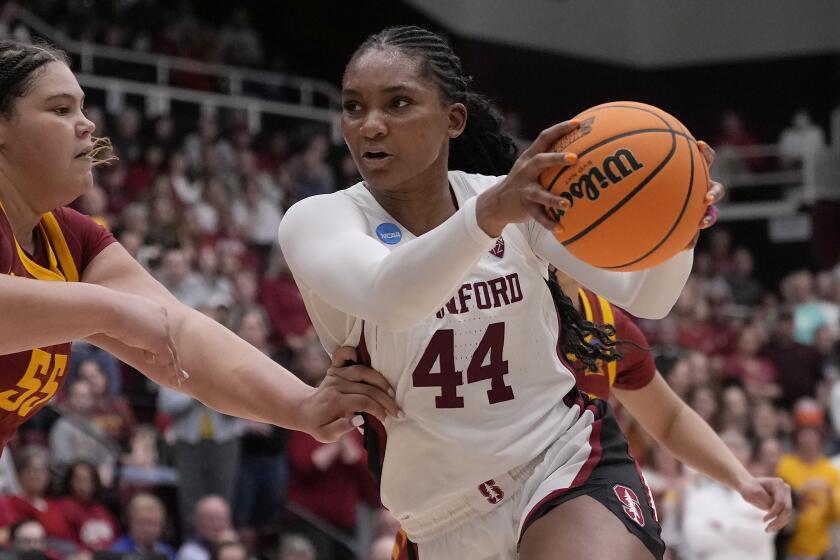Rose Bowl Finds a Thorn in BCS
This week’s most misleading news bulletin: Six years after it joined the bowl championship series, the Rose Bowl would like to abandon the BCS and return to its traditional format of matching the champions of the Pacific 10 and Big Ten conferences.
The key words are would like and, unfortunately, can’t.
“If there was a way to turn back the clock and make everything the way it was, we’d prefer the way it was before,” Rose Bowl CEO Mitch Dorger said. “But everything is not the way it was.”
While the Rose Bowl did college football a huge favor in 1998 when it agreed to join the BCS, it did the Rose Bowl no favors.
That has become clear with each passing season.
In joining the BCS, the Rose Bowl agreed to host the national-title game every four years and surrender the Pac-10 and/or Big Ten champion to the title game if either of those schools was ranked No. 1 or No. 2.
The Rose Bowl/Pac-10/Big Ten compact had been a stunningly successful partnership dating to 1947.
The Rose Bowl was the final piece in a postseason puzzle that allowed No. 1 and No. 2 to play in an annual championship game. In 1994, for example, undefeated Penn State couldn’t play No. 1 Nebraska for the title because the Nittany Lions were contractually bound to the Rose Bowl.
Joining the BCS, however, has been no pregame picnic. The Granddaddy of all bowl games has lost swagger and, more important, power.
After being its own boss for decades, the Rose Bowl is now driftwood on the BCS current.
These have been frustrating and confounding -- if not financially fruitful -- times, and there is just something strange about the Rose Bowl not having the biggest float in any parade.
Yet, the television truck is too far down the BCS road for the Rose Bowl to reminisce now, and the best the bowl can do is cash pay checks and chip away at the infrastructure.
The Rose Bowl thought it was going to be able to stage a Pac-10/Big Ten matchup in years when it wasn’t hosting the national-title game, but that hasn’t been the case.
In fact, the last traditional pairing came in the 2001 Rose Bowl, when Washington defeated Purdue.
In 2002, as per its contract, the Rose Bowl hosted the national-title game between Miami and Nebraska.
Last year, the Orange Bowl used a contractual provision to buy its way up in the rotation and steal Iowa to pair against USC in what would have been a classic Rose Bowl. The Rose Bowl ended up with Washington State-Oklahoma.
This year, another potential nightmare looms.
Should USC and Ohio State end up No. 1 and No. 2 in the final BCS standings, the Rose Bowl would have to give up arguably the best Rose Bowl ever to the Sugar Bowl, which is hosting this year’s national-title game.
This week, USC is ranked No. 3 in the Associated Press poll, and Ohio State is No. 4.
Dorger is hoping form holds. His dream scenario would be for No. 1 Oklahoma and No. 2 Miami to end up as the top two teams in the BCS and play in the Sugar Bowl, which might leave the Rose Bowl with USC vs. Ohio State.
But even if the Rose Bowl’s worst-case scenario is realized, the bowl has few options.
With negotiations to begin next year on the new BCS contract, which expires after the 2005 season, the Rose Bowl has little leverage to leave the BCS.
“To even ask the question of going back is unrealistic,” Dorger said. “The larger question is who would you be going back with? We may be going back but without any partners.”
The Rose Bowl, Pac-10 and Big Ten have separate contracts with the BCS. The Rose Bowl could pull out, all right, but the Pac-10 and Big Ten would never go along because that would deny their member schools a chance of winning the national title.
Consider that Ohio State only won the championship last year because it was allowed to play No. 1 Miami in the Fiesta Bowl. Under the old system, Ohio State would have played Washington State in the Rose Bowl.
What the Rose Bowl is doing now is trying to win small battles to strengthen its position in the new BCS.
Dorger calls this trying to “get recognition within the system.”
Dorger said this week the Rose Bowl has forwarded a proposal to BCS commissioners that would shore up the loophole that allowed Big Ten co-champion Iowa to play in the Orange Bowl last year.
The Rose Bowl was understandably outraged it could not select either of the Big Ten co-champions, Ohio State or Iowa.
Dorger said the new proposal would protect all bowls with “anchor-school” ties, not just the Rose.
“It’s the fairest way,” Dorger said. “Other people have the same problem.”
Dorger said the proposal is being considered by the BCS, and there’s a chance it could be enacted this year.
“I believe the Iowa situation is not going to be repeated,” Dorger said.
As for the big picture, well, the Rose Bowl is resigned to its football fate.
It may never again call the important shots -- the price you pay for joining a club.
Is different bad?
“Different is just different,” Dorger said. “It’s a different world for all the bowls, including us.”
And so the Rose Bowl is left with curious rooting interests.
It wants USC to do well this year -- just not too well.
“We wish them great success,” Dorger said of the Trojans, “and hope they finish No. 3 in the country.”
More Rose
If USC and Ohio State finish 1-2 in the BCS, why couldn’t they just play for the national title in the Rose Bowl?
That subject was broached before the Rose Bowl joined the BCS in 1998, but the idea was deemed unworkable.
“That sort of went away because of the logistics,” Dorger said. “It’s a nice idea, but you need to gear up for the national-title game. You can’t just pull it from the Sugar Bowl on Dec. 7. You just can’t do it.”
Hurry-Up Offense
* Welcome back, fabled friends. Florida State and Nebraska, the most successful programs of the 1990s, are a combined 7-0 headed into weekend play. This, after the schools lost a combined 12 games in 2002. The key to both resurgences has been obvious: defense. Nebraska ranks No. 1 in total defense this week, while Florida State is No. 6.
Florida State is No. 1 in scoring defense; Nebraska is No. 2.
Last year, Nebraska was 55th in total defense, and Florida State ranked 61st.
For Florida State, it was a matter of a young but talented defense coming of age under coordinator Mickey Andrews, one of the nation’s best.
At Nebraska, more drastic action was required as Coach Frank Solich fired six assistants, including defensive coordinator Craig Bohl. Solich replaced him with Bo Pelini, a high-energy Green Bay Packer assistant who has energized the Cornhusker “Blackshirts.” Solich says Pelini reminds him of Charlie McBride, Nebraska’s famed coordinator during the Tom Osborne years. “He’s a very intense coach,” Solich said of Pelini. “I think that’s recognized by everybody. As I go out on that field, what I see is coaches coaching fast. They’re coaching fast and coaching hard.”
* Despite the success of the Mid-American Conference this year, MAC coaches know the real score when it comes to competing against the BCS schools. The conference is plagued by low attendance, inferior facilities and general obscurity. Let’s face it, the MAC is a tough sell to corporate America.
“We lack some of the exposure that even Conference USA teams get because they’re in big cities,” Northern Illinois Coach Joe Novak said.
With hubs in Akron, DeKalb, Kent, Muncie and Bowling Green, the MAC will have a tough time convincing television networks it is a BCS-worthy conference. Even now, strictly because of economics, Conference USA has five bowl tie-ins to the MAC’s two. Is that fair? No. But it’s reality.
Novak’s team is 3-0, with victories over Maryland and Alabama, yet his team doesn’t even have a practice facility. “We practice in our stadium, every day,” he said. Novak also said there would be no sympathy for his team should it go 13-0 and not receive a BCS bowl bid. “With a league like ours getting in, it cuts into other peoples’ money,” he said.
* It’s looking more and more as if the Big East Conference will expand to 16 teams and split into a loose, football/basketball confederation. The Boston Globe reported this week that conference presidents may ratify the new format in November. With Miami and Virginia Tech leaving next year for the Atlantic Coast Conference, the Big East would raid four teams from Conference USA: Louisville, Cincinnati, Marquette and DePaul. Louisville and Cincinnati would replace Miami and Virginia Tech on the football side, with Marquette and DePaul adding a powerful punch to an already strong basketball conference.
The big loser here is Conference USA, although there are reports the conference is looking to fill its losses by recruiting Southern Methodist, Tulsa and Rice from the Western Athletic Conference. Let the domino falling begin.
More to Read
Get our high school sports newsletter
Prep Rally is devoted to the SoCal high school sports experience, bringing you scores, stories and a behind-the-scenes look at what makes prep sports so popular.
You may occasionally receive promotional content from the Los Angeles Times.







